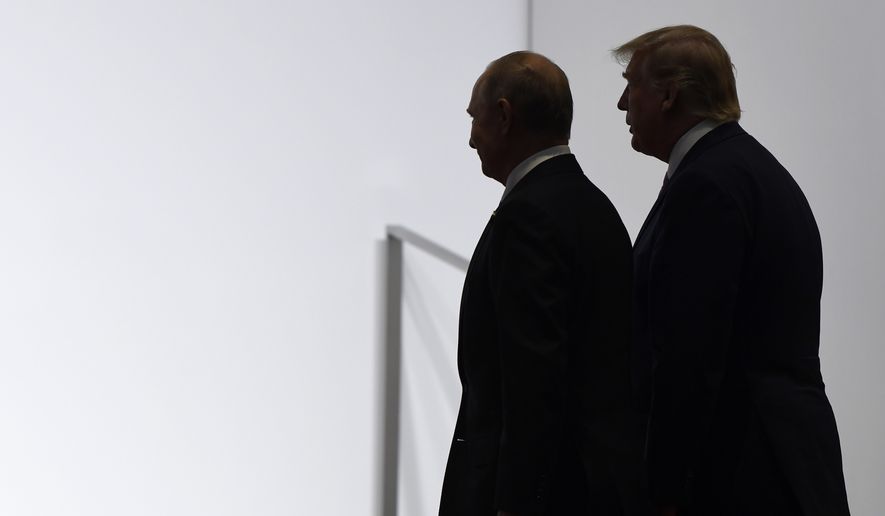OPINION:
In times of major crisis, one always hears two familiar questions: “Whom to blame?” and “What to do?”
With the COVID-19 pandemic sweeping the globe, there are many attempts to answer the first one but practically none to the second.
The most overheated blame game is going on between Washington and Beijing.
But even in the midst of a rising “Chinagate,” a quick scan of the headlines shows that the Russiagaters haven’t forgotten about their favorite bogeyman, Vladimir Putin.
New York Times: “Putin’s Long War Against American Science: A decade of health disinformation promoted by President Vladimir Putin of Russia has sown wide confusion, hurt major institutions and encouraged the spread of deadly illnesses.”
Bloomberg News: “Coronavirus Has Exposed Putin’s Brittle Regime.”
CNN: “As coronavirus hits record numbers in Russia, this is a dangerous moment for Putin.”
Washington Examiner: “Could it be time for another Russian revolution?”
President Trump also gets his share of the blame. The New York Times accuses him of “shaking fundamental assumptions about American exceptionalism — the special role the United States played for decades after World War II as the reach of its values and power made it a global leader and example to the world.” Mention of “values” by the newspaper sounds especially cynical these days when the Gray Lady’s loss of its integrity and journalistic ethics are on the full display.
Moving now to the “What to do?” part, let’s take a look back in history. This is especially appropriate around the Victory in Europe Day, or V-E Day, on May 8.
It was a refreshing surprise for many to read the joint statement issued by Presidents Trump and Putin on April 25 marking the 75th anniversary of the meeting at a bridge over the Elbe River in Germany of Soviet soldiers advancing from the east and American troops from the west.
“This event heralded the decisive defeat of the Nazi regime,” the statement said. “The ’Spirit of the Elbe’ is an example of how our countries can put aside differences, build trust, and cooperate in pursuit of a greater cause.”
I see this as a call by two presidents to start talking about a real reset — rather than the fake Obama-Clinton one back in 2009 when they could not even find the proper Russian translation for “reset.”
Instead of praising both leaders for honoring war veterans and saying important words, Rep. Eliot Engel, New York Democrat and chairman of the House Foreign Affairs Committee, said, “Everyone knows that Trump has a bizarre infatuation with Russia’s autocratic leader and that Trump constantly plays into Putin’s hands.”
These days, there are many such Engels in Congress. Perhaps this is one of the reasons why Congress and the media that also criticized the Trump-Putin statement have lost the trust and respect of the American people.
In any event, good words should be followed up with good deeds. As one of the “deplorables,” I trusted Mr. Trump during the 2016 campaign and his inauguration speech when he pledged to bring U.S. troops home and end President Bush’s and President Obama’s wars. I also agreed with him that today, as during World War II, “getting along with Russia is a good thing, not a bad thing.”
Regrettably, none of these promises was fulfilled. Indeed, U.S.-Russian relations are now worse than ever. Some analysts warn that the latest nuclear arms race has brought the world closer to doomsday than it was even in the depths of the Cold War.
Mr. Trump can rightfully blame the “adults in the room,” the “Deep State,” the “Washington swamp” or the “fake news” media all he wants, but that doesn’t address the problem. What is needed are actions that follow logically from his 2016 statements, including that of NATO losing its purpose and becoming obsolete.
Sharon Tennison of the Center for Citizen Initiatives, David Speedie of the Carnegie Council for Ethics in International Affairs and Krishen Mehta of Yale University came up with 10 reasons why we do not need NATO anymore. All 10 are valid, but here I will quote only one that I believe is the most relevant today: “Exotic war games in Russia’s neighborhood — coupled with a tearing up of arms control treaties — provides a growing threat that can destroy everyone, particularly when international attention is focused on a more elusive “enemy.” The coronavirus has joined the list of global threats that demand cooperation rather than confrontation even more urgently than before.”
To summarize, Mr. Trump has the right foreign policy instincts that he vocalized in 2016, but let’s acknowledge that he failed in implementing them during his first term. It remains to be seen whether he can do a better job going forward — if the voters give him another chance.
⦁ Edward Lozansky is president of American University in Moscow.




Please read our comment policy before commenting.